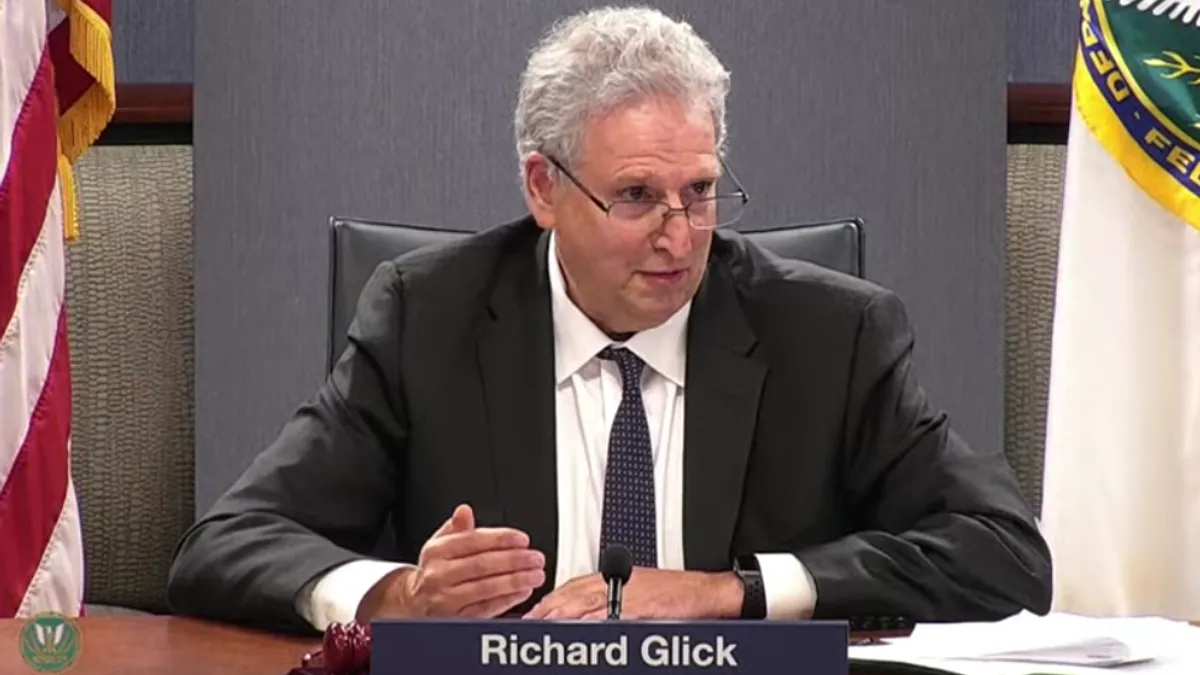Federal Energy Regulatory Commission Chairman Richard Glick said Thursday he will leave the agency when the 117th Congress ends Jan. 3, setting up possible 2-2 deadlocks on some issues.
“Congress is adjourning very soon. I think it's pretty clear that there's not a path forward anymore for the president's nomination for me to serve a second term,” Glick said at the agency’s monthly meeting.
During Glick’s tenure as chairman, FERC advanced proposals to spur transmission development, strenghthen natural gas pipeline reviews and protect the grid from extreme weather, among other initiatives. Many of those efforts are ongoing.
FERC’s work has been “inextricably linked” to the energy transition, some of which has been controversial, Glick said.
“I don't expect that that's going to change,” he said. “If anything, I think that's going to increase. It's just the nature of our society, but it's the nature of what's going on [with] the transition that's underway.”
FERC regulates the interstate transmission of natural gas, oil and electricity. It also regulates natural gas and hydroelectric projects. It oversees wholesale electricity markets and determines how much return utilities can earn on their interstate transmission investments.
There are two major issues driving FERC’s work, according to Glick. The first is the steps utilities, states and the federal government are taking to respond to climate change, he said.
“It's been the subject of a lot of controversy here at the commission, but it's something that we have to tackle as a society,” Glick said.
The second key issue is making sure the United States has enough reliable energy, according to Glick.
Glick’s exit will leave FERC with two Democratic commissioners, Allison Clements and Willie Phillips, and two Republicans, James Danly and Mark Christie, potentially slowing the agency’s decision-making. President Joe Biden will likely name Clements or Phillips to succeed Glick as FERC chairman.
The vast majority of FERC’s decisions are unanimous, but having four commissioners could leave them divided on some issues. Five commissioners are better than four, but the agency’s work won’t come to a standstill, Glick said during a media briefing.
Also, Danly’s term ends June 30, giving the Senate an opportunity to pair his replacement with Glick’s successor, he said. The Senate typically advances FERC nominees in pairs.
“I very much hope that the president nominates our replacements and moves forward as quickly as possible, as well as the Senate,” Glick said.
Glick said he isn’t interested in returning to the agency and he doesn’t have a job lined up.
Without giving a reason, Senate Energy and Natural Resources Committee Chairman Joe Manchin, D-W.Va., said in November he wouldn’t hold a confirmation hearing for Glick.
Manchin is a critic of FERC policies for reviewing natural gas pipelines and last month lashed out at President Joe Biden for comments he made about coal-fired power plants.
Glick, a former Senate aide, joined FERC in late 2017 after being nominated by then-President Donald Trump. Biden elevated him to chairman in January 2021. As allowed, he kept working at FERC after his term expired June 30.
Glick kickstarted a comprehensive rulemaking process that when completed will lead to the approval of more transmission lines and progress on the massive backlog of solar, wind and storage projects in the interconnection queues, according to John Moore, director of the Sustainable FERC Project, an advocacy group housed at the Natural Resources Defense Council.
“All of these efforts have support at FERC,” Moore said Thursday in an email. “Given there will be four members on the commission for a few months, it will be crucial that commissioners work together to bring these policies to completion. Given the importance of this effort, I am confident they can do it.”
Gregory Wetstone, American Council on Renewable Energy president and CEO, said he is concerned a divided FERC could stall progress on pending transmission planning rules that are seen as needed for fulfilling the potential of the Inflation Reduction Act.
“We respectfully urge the president to quickly nominate a worthy successor and call on the Senate for rapid confirmation to restore a full complement of five FERC commissioners,” Wetstone said in a statement.















